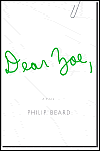 Several thousand people died on September 11, 2001. The date alone grabs one’s attention and screams REMEMBER THIS DAY. We see the burning tower and the second airliner crashing into the tower’s twin. News reports of the Pentagon and Pennsylvania tragedies spread new shockwaves, while images of the towers collapsing upon the thousands of souls inside sear our sorrow. Philip Beard frames his poignant YA novel Dear Zoe around that day. But not as one would expect.
Several thousand people died on September 11, 2001. The date alone grabs one’s attention and screams REMEMBER THIS DAY. We see the burning tower and the second airliner crashing into the tower’s twin. News reports of the Pentagon and Pennsylvania tragedies spread new shockwaves, while images of the towers collapsing upon the thousands of souls inside sear our sorrow. Philip Beard frames his poignant YA novel Dear Zoe around that day. But not as one would expect.It was an ordinary day for 15-year-old Tess DeNunzio—ordinary in as much as she’d missed the bus to school yet again and was biding time until her mother would drive her to school. The day became extraordinary when news of the Twin Towers exploded in her life. Of the thousands of people who died that day one of them would impact Tess and her family with the same gripping grief, but played out in a Pittsburgh emergency room.
In the confusion of those moments, when the eyes of the world were on the Twin Towers, Tess’s three-year-old sister Zoe was hit by a car. That Zoe died that infamous day haunts Tess as much as losing her all together. It drives Tess through an adolescence already complicated by enigmatic feelings for her successful stepfather; her doting, but low-life father; her mother’s descent into depression; blended-family issues informed by these dynamics, and finally her emerging sexuality.
While the world still shivers from the terror of 9/11, Tess stretches to understand and eventually seek her own redemption by writing letters to Zoe. In these letters we glimpse the intimate details of Tess’s life, from her obsessive make-up ritual in the mornings, to her lack-luster performance at school, to her first boyfriend and where that predictably goes. Tess’s letters to Zoe dig at the scab covering Zoe’s death, picking and peeling until Tess confronts the awful truth about Zoe’s death.
As important as the story of Dear Zoe is the story behind its publishing. Dear Zoe was Philip Beard’s second novel. Despite the championing of a good literary agent, his first novel was turned down by twenty-seven publishing houses. Dear Zoe, which Philip wrote in part to reach out to his own stepdaughter, had great personal as well as professional significance to him. After the first several rejections of Dear Zoe rolled in with suggestions that the epistolary style be changed to a traditional POV, he caved and revised to first person. The next round of twenty-eight rejections on the revised-to-first-person version crashed his faith in commercial publishing.
Determined to see Dear Zoe in print, Beard established his own publishing house with the intention of self-publishing. During the months of preparation to self-publishing, Beard had given permission for a Penguin sales rep he’d met through a mutual acquaintance to submit the original epistolary version on his behalf. Only days away from writing the check for his first print run, the president of Viking Penguin called Beard with an offer to publish Dear Zoe in Philip’s original epistolary form.
Beard’s ambitions for Dear Zoe were eventually met through traditional publishing. But had the circumstances found the novel released under Beard’s publishing imprint, it wouldn’t have changed the significance of its impact. Growing up is hard. Add some grief and wrap it in guilt for an even harder journey. Dear Zoe could have been just another coming of age novel filled with adolescent angst. Thankfully, it’s not. Beard’s astonishing ability to write in the voice of a teenage girl and his insightful commentary on the age has created a compelling elegy for the post-9/11 generation.
This review of Dear Zoe was commissioned by NimbleSpirit, the Spiritual Literary Review. Read more about Philip Beard and his publishing triumphs.
No comments:
Post a Comment